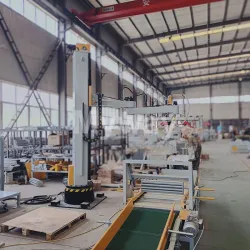How Can Palletizers Revolutionize Your Business?
In the ever-evolving landscape of industrial automation, palletizers stand out as a game-changer, streamlining the packaging process and boosting operational efficiency. This comprehensive guide aims to address the pivotal questions buyers often have when considering the integration of palletizers into their operations. From the quality and performance of these machines to their cost-effectiveness, innovation, technology integration, and commitment to environmental protection and sustainability, this article provides a roadmap for businesses seeking to revolutionize their packaging processes.
Unveiling the Working Principle
Before delving into buyer concerns, it's crucial to understand the fundamental working principle of palletizers. These sophisticated machines are designed to automate the task of arranging products on pallets systematically. Various types, including robotic, conventional, and high-level palletizers, employ unique mechanisms to achieve this common goal.
Ensuring Quality and Precision
Buyers rightly prioritize the quality of palletizers, seeking precision in product placement, reliability, and overall durability. Modern palletizers meet these expectations by integrating advanced sensors and software, ensuring accurate stacking and minimizing errors. This guarantees a consistent and secure arrangement of products on pallets, elevating overall quality.
Evaluating Performance Metrics
Performance is a critical factor in the buyer's decision-making process. Metrics such as the speed of operation, adaptability to different product types, and reliability in a production environment are key considerations. High-performance palletizers not only optimize packaging processes but also contribute to increased overall productivity, making them indispensable for businesses.
Unpacking the Cost-Effectiveness
The initial investment is a common concern for buyers considering palletizers. Understanding the long-term benefits is essential to grasp the true cost-effectiveness of these machines.
Analyzing Long-Term Benefits
While the upfront cost may seem significant, the efficiency gained through automation leads to reduced labor costs, increased productivity, and minimized errors. Businesses experience a rapid return on investment, making palletizers a financially sound choice. The durability of modern palletizers further contributes to minimal maintenance costs over time, enhancing their overall cost-effectiveness.
Embracing Innovation and Technology
Palletizers have evolved with advancements in technology, embracing innovation to meet the demands of modern industrial settings.
Harnessing Industry 4.0 Technologies
Integration with Industry 4.0 principles, such as the Internet of Things (IoT), has elevated palletizers' capabilities. Real-time monitoring and control, facilitated by IoT connectivity, empower businesses to optimize their operations. Machine learning algorithms further contribute to adaptability, enabling palletizers to handle diverse product shapes and sizes with ease.
Commitment to Environmental Protection and Sustainability
As sustainability becomes a key consideration for businesses, buyers are increasingly seeking eco-friendly solutions. Palletizers have responded to this demand by incorporating sustainable features.
Eco-Friendly Practices
Modern palletizers include energy-efficient motors and the use of recyclable materials, minimizing their environmental impact. By reducing packaging waste and optimizing pallet stacking, palletizers contribute to a greener supply chain. These eco-friendly practices align with the broader corporate responsibility initiatives of businesses.
Addressing Key Buyer Concerns
Understanding the questions buyers commonly have is essential to providing comprehensive information about palletizers.
1. How much does a palletizer cost initially?
The initial cost varies based on the type and complexity of the palletizer. However, the long-term savings in labor costs and increased efficiency make it a worthwhile investment for businesses.
2. What is the maintenance cost of a palletizer?
Modern palletizers are designed for durability and reliability, resulting in relatively low maintenance costs. Predictive maintenance technologies further minimize downtime, contributing to the overall efficiency of palletizing systems.
3. Can a palletizer handle different product types?
Yes, palletizers are designed to adapt to various product shapes and sizes. Their flexibility makes them suitable for industries with diverse packaging requirements, offering a scalable solution for different needs.
4. How does a palletizer contribute to environmental sustainability?
Palletizers contribute to sustainability by minimizing packaging waste, optimizing pallet space, and incorporating energy-efficient features. These eco-friendly practices align with the global shift towards greener business operations.
5. Is training required to operate a palletizer?
Training requirements are minimal, as modern palletizers often come with user-friendly interfaces and intuitive controls. This simplicity facilitates the integration of palletizers into existing production processes.
Revolutionizing Your Business with Palletizers
In conclusion, palletizers represent more than just a technological addition to your operations; they can revolutionize the way you handle packaging. By understanding their working principle, evaluating their quality, performance, and cost-effectiveness, and recognizing their commitment to innovation and sustainability, businesses can make informed decisions. Investing in palletizers is not just an upgrade—it's a strategic move towards a more efficient, sustainable, and future-ready approach to industrial packaging.




